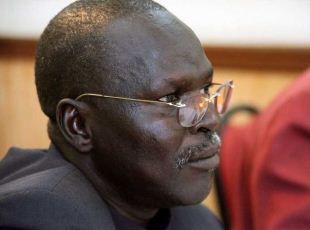S. Sudan rebels deny peace deal and vow to carry out more attacks
February 29, 2012 (JUBA) – Members of the South Sudan Democratic Movement (SSDM), an active rebel groups fighting against the government of South Sudan’s ruling Sudan People’s Liberation Movement (SPLM), has categorically denied the veracity of a peace agreement signed with the Juba administration.

“We have not signed any agreement with anybody. What the minister of information in the government has said is not correct,” announced John Olony on Wednesday, claiming to be the new leader of the rebel group.
Olony claims the agreement’s signatories defected in early February, prior to the signing, and that they no longer represent the leadership of the SSDM.
Olony claimed his group received information from Peter Kuol Chol Awan, who became the SSDM head after the death of George Athor, that he wanted to resign due to health issues. Olony claims Awan informed the rebels that he would be resigning, then signed the agreement, purportedly, on their behalf.
George Athor formed the SSDM in 2010 after losing a regional election he claimed was rigged. The South Sudanese army, the Sudan People Liberation Army (SPLA), said in December 2011 that it had killed him.
“They have responded to the amnesty offered to them by the president Salva Kiir Mayardit by declaring a ceasefire and accepted to lay down their arms. This is a good step which actually indicates that the sons and daughters of this country can resolve difference amicably without external support,” said Marial at a press conference on Tuesday.
Explaining that it was the policy of the government to absorb all ex-militia groups into the national army after reaching a deal in order for them to start a peace process instead of pursuing military options, Marial said the agreement gave the rebels an opportunity to be represented in the national government as well as in the state.
He said if the rebels laid down their arms they would be integrated into the SPLA.
Abiel Riing Majak, a senior member of the rebel group, told Sudan Tribune on Monday that the movement had reached an agreement with the government in Juba but expressed concern about whether or not the deal would be implemented.
James Nuot, a spokesman of the rebel group told Sudan Tribune said they have only signed a memorandum of understanding to pave the way for more discussions on the future of their troops.
“If it is respected, then we shall move on to discuss other issues including participation in the national government and states,” Nuot told Sudan Tribune on Wednesday.
Nuot claimed that it has always been their intention to reach a peace deal with the government because it is time to put aside differences and pay attention to nation building. “Our people have had enough while fighting for more than 55 years,” he explained.
The military alliance of the four rebel movements including the SSDM claim they will soon begin Operation Ending Corruption to depose Salva Kiir from his seat of power in Juba.
“We therefore advise civilians in Malakal, Piji, Fangak, Renk and Maban to leave the towns and go to villages for protection,” the SSDM announced on Tuesday.
The release further claims that SSDM with its coalition partners will “demonstrate to the whole world that they did not sign any agreement with the regime under President Salva Kiir”.
The coalition includes the South Sudan Liberation Army/Movement (SSLA/M), South Sudan Defense Forces (SSDF) and National Democratic Front. The SSLA/M’s involvement in the coalition is uncertain after accusations of collusion with Khartoum.
“Very soon our military commanders will attack SPLA positions in Jonglei and Upper Nile States, as a proof that SSDM had signed peace with Kiir” it adds.
Juba claims Khartoum provides support to militia groups to destabilize South Sudan. Khartoum denies the accusations and levels the same claims against Juba. There is evidence to support Juba’s claims, including a Small Arms Survey report which indicated “strong circumstantial evidence” that South Sudan rebels had received logistical and material support “from Khartoum and other external sources”.
(ST)
